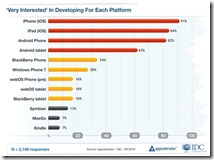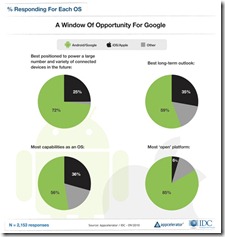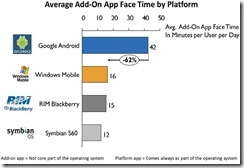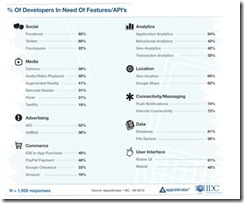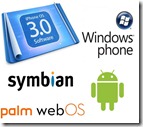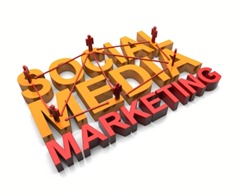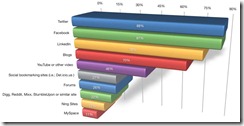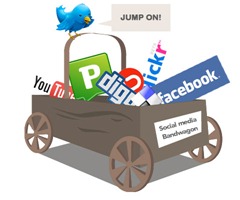 To face Social Media exponential growth, or should I better say explosion, and to help keep up with so many new sites, services, apps coming-up every day, helping businesses connect and engage more directly with customers, I thought I will take a step back and try to point you to what’s in my view are the Top 10 latest trends in Social Media in a Marketing perspective.
To face Social Media exponential growth, or should I better say explosion, and to help keep up with so many new sites, services, apps coming-up every day, helping businesses connect and engage more directly with customers, I thought I will take a step back and try to point you to what’s in my view are the Top 10 latest trends in Social Media in a Marketing perspective.
1- Large Enterprise adoption of social media platform: America’s Fortune 500 have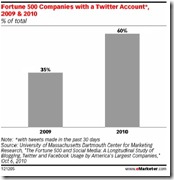 increased their participation in Twitter, from 35% in 2009 to 60% in 2010, and 56% have a Facebook page, according to a yearly report from the Center for Marketing Research.
increased their participation in Twitter, from 35% in 2009 to 60% in 2010, and 56% have a Facebook page, according to a yearly report from the Center for Marketing Research.
2- SBM adoption of social media platform starts growing: according to research by Zoomerang and GrowBiz Media, 34% of SMB companies (less than 1,000 employees) use social media, 10% is allocating 30% of their marketing budget to social media, and 13% will spend more on social media next year.
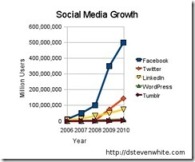 3- Audience Growth: According to The Nielsen Company, global consumers spent more than five and half hours on social networking sites like Facebook and Twitter in December 2009, an 82% increase from year before. Teens and young adults spend more and more time on social media, and now older people (50 to 65 years old) represent the most growing population of social media users. Facebook already has over 500M users and growing exponentially everyday, and over 150M twitter users, and growing even faster. Social Media becomes more popular, and social business becomes a play that companies marketers can’t ignore anymore.
3- Audience Growth: According to The Nielsen Company, global consumers spent more than five and half hours on social networking sites like Facebook and Twitter in December 2009, an 82% increase from year before. Teens and young adults spend more and more time on social media, and now older people (50 to 65 years old) represent the most growing population of social media users. Facebook already has over 500M users and growing exponentially everyday, and over 150M twitter users, and growing even faster. Social Media becomes more popular, and social business becomes a play that companies marketers can’t ignore anymore.
4- Corporate Policies: Result is many companies are now setting up official company guidelines, policies and best practices for usage of social media tools and services, specially when representing the company via social media.
 5- Like in Real estate social media is now about “Location, Location, Location” (see my blog on that topic) –With latest Facebook announcement launching its new Geo-Location feature, “Facebook Places”, Facebook is moving from a basic Social Networking space for friends to a business-oriented tool for local businesses. Location-Based-Services once integrated via APIs to services as Facebook are going to change the Internet over-all, as the internet will become “less about the searching and more about the getting“, less about Search Engines and more about Apps.
5- Like in Real estate social media is now about “Location, Location, Location” (see my blog on that topic) –With latest Facebook announcement launching its new Geo-Location feature, “Facebook Places”, Facebook is moving from a basic Social Networking space for friends to a business-oriented tool for local businesses. Location-Based-Services once integrated via APIs to services as Facebook are going to change the Internet over-all, as the internet will become “less about the searching and more about the getting“, less about Search Engines and more about Apps.
6- Social Media becomes more and more Mobile: Facebook and Twitter access via mobile phones has grown by triple digits in the last year.  Advertising & Mobile advertising is becoming a major source of revenue and a BIG business for social media platforms. The detailed personal information they detain on their users coupled with location based services is a dream come true for any marketer and advertiser. Facebook advertising revenue forecast from advertising is around $1.3 billion in 2010, and $1.7 billion in 2011, and has not yet penetrated the Mobile Ad market, which they will do with “Places”.
Advertising & Mobile advertising is becoming a major source of revenue and a BIG business for social media platforms. The detailed personal information they detain on their users coupled with location based services is a dream come true for any marketer and advertiser. Facebook advertising revenue forecast from advertising is around $1.3 billion in 2010, and $1.7 billion in 2011, and has not yet penetrated the Mobile Ad market, which they will do with “Places”.
7- Social Commerce & Mobile Payment is a growing trend in social media and social business world, offering the ability to make purchases and micro-transaction from mobile apps, mobile social media platforms and social gaming, embraced by major finance players as Visa, Paypal etc..
8- Email marketing is becoming more Social: Recent acquisitions like Constant Contact acquiring NetShellMail and Exact Target acquiring CoTweet are good examples of this new trend, merging email marketing with social media, and the emergence of a more interactive marketing platform to engage with customers..
9- Another new trend is Group Buying: Groups in a social network can get discounts or group rates on products or services. Social sites like Living Social and Groupon are focusing on this market, a new business model for retailers and local stores.
 10- Finally Analytics and Return on Investment measurement has become increasingly critical for marketers to analyse and justify their return on social media marketing investment. More and more tools are available and in the future the winning social media platform will be the ones with the best analytics tools.
10- Finally Analytics and Return on Investment measurement has become increasingly critical for marketers to analyse and justify their return on social media marketing investment. More and more tools are available and in the future the winning social media platform will be the ones with the best analytics tools.
There are of course others trends in Social Media, some more specifics to specific countries, population, industries, businesses, and this new area of marketing-Communication is evolving so rapidly, trying to predict the future is often more like guessing, so pragmatically, as a marketer take advantage of those latest trends to optimize your social media marketing strategy and tactics.
Filed under: Digital Marketing, email marketing, Integrated marketing, Marketing, mobile, social network, Wireless/Mobile | Tagged: advertising, constant contact, cotweet, email marketing, exact target, facebook, group buying, groupon, living social, Location Based Services, marketing, mobile advertising, mobile marketing, mobile payment, netshellmail, social commerce, social gaming, social marketing, Social Media, social media adoption, social media analytics, social media marketing, social media measurement, social media policies, social media roi, social network, twitter | 8 Comments »




